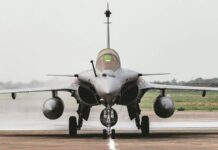 NEW DELHI: The entire 50-strong global fleet of Boeing 787 Dreamliners, including six of Air India, were grounded today as US regulator Federal Aviation Administration asked airlines to cease operations of these planes temporarily till a battery fire risk was corrected.
NEW DELHI: The entire 50-strong global fleet of Boeing 787 Dreamliners, including six of Air India, were grounded today as US regulator Federal Aviation Administration asked airlines to cease operations of these planes temporarily till a battery fire risk was corrected.
After a battery fire incident in Japan on a Dreamliner yesterday, the FAA issued an emergency airworthiness directive to address the problem requiring all “operators to temporarily cease operations. Before further flight, operators of US- registered Boeing 787 aircraft must demonstrate to the FAA that the batteries are safe.”
The American aviation regulator said in a statement that it would “work with the manufacturer and carriers to develop a corrective action plan to allow the US 787 fleet to resume operations as quickly and safely as possible.”
However, no time-line was given as to by when these high -tech aircraft would be able to take to wings again.
While United Airlines, the only US carrier now flying the Dreamliner, grounded its six planes, Air India also ceased flights of six of these aircraft currently in its fleet.
“When the FAA issues an airworthiness directive, it also alerts the international aviation community to the action so other civil aviation authorities can take parallel action to cover the fleets operating in their own countries,” an FAA spokesperson said.
Following the FAA directive, the Directorate General of Civil Aviation (DGCA) advised Air India to ground its Dreamliner fleet with immediate effect.
“Certainly, we will not fly the Dreamliner until the FAA and our own DGCA give clearance,” Civil Aviation Minister Ajit Singh told reporters here.
The DGCA was in touch with FAA and “what I know is that Boeing has to come with a plan for the FAA to test all the electrical system and batteries. When that plan comes up, we will also test them but basically first FAA has to approve that they are safe to fly.”
The grounding of the Dreamliners would not have any impact on Air India’s operations, airline officials said, adding the flights to Dubai, Paris and Frankurt operated by these airplanes would now be serviced by Boeing 777s.
While one of the six planes is always on a standby, three are used on the domestic sector and two on the international routes, they said, adding that domestic services would be absorbed by the existing fleet of aircraft.
After the battery fire incident in Japan yesterday, the country had grounded 24 Dreamliner owned by two of its airlines – All Nippon Airways and Japan Airlines.
This followed a similar incident in Boston on January seven. Both incidents involved lithium ion batteries whose failures “resulted in release of flammable electrolytes, heat damage and smoke on two 787 airplanes,” the FAA said.
Since Friday last, the FAA and Boeing have been probing the reasons behind these battery failures, it said, adding “these conditions, if not corrected, could result in damage to critical systems and structures, and the potential for fire in the electrical compartment.”
The FAA directive was immediately adhered to by aviation regulator of countries whose airlines have so far bought these latest aircraft, including the DGCA.
Three of these planes, all owned by Japanese carriers, have suffered technical and other problems this month – an electrical fire, fuel leakage and a broken cockpit window.
In September last, Air India had also experienced a malfunctioning in a Dreamliner’s liquid cooling system and electrical power system which had led to the grounding of all three of these planes at that time.
After the faults were rectified, these aircraft were so far flying on select domestic and international routes.
Regarding the fuel leak problem, Air India officials had said this was not something “unusual as it occurs in all aircraft types. Such problems have to be rectified immediately but these are not anything new or different.”
Boeing has designated a team in Delhi for any trouble-shooting for the Dreamliners, which are considered the most technologically advanced aircraft made of lightweight composite materials instead of aluminum.
In a similar instance in February 1990, the then Indian Airlines had grounded its entire fleet of 18 Airbus A-320s after a fatal crash in Bangalore and several more serious technical breakdowns in the past. The embargo was lifted after eight months on October 30 that year.-PTI






